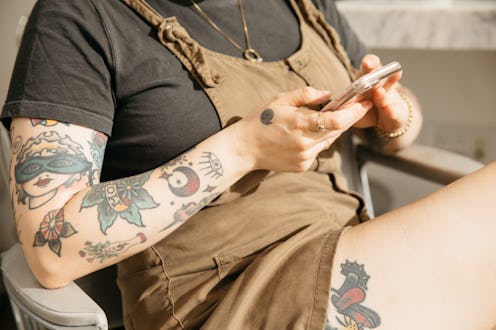Life
The Science Behind Why You Want Another Tattoo Immediately After Getting A New One

People with tattoos will be familiar with that post-tattoo feeling: you're so keen on your new ink that you immediately begin to plot your next trip to the artist, even if you have no real ideas in mind. My own tattoo artist advises first-time tattoo receivers to postpone their next trip for six months to get over the initial excitement of their acquisition. But is getting tattooed actually "addictive"? Or is the psychology of tattooing and other modifications more complicated than that?
"Many people who claim they are addicted to tattoos and body modification find that the physical pain of these experiences is a big part of what drives them to seek more," psychologist Dr. Sal Raichbach of Ambrosia Treatment Center tells Bustle. "These individuals are likely referring to the surge in brain chemicals that the body naturally releases to deal with physical pain. These are the same mechanisms that lead to addiction to drugs and alcohol, but the body does not become dependent on these behaviors as it would with substance abuse."
There's plenty of science to back that up. Studies have found that getting a tattoo releases both adrenaline and endorphins, which relieve pain and cause positive emotional response. According to neuroscientist David J. Linden writing for The New York Times, short bursts of endorphins, which also come after exercise, can be hugely positive, but craving these bursts seems to be very rare. In people who have this reaction, he writes, intense exercise and other endorphin-boosting activity "appears to cause the release of endocannabinoids, which are the brain’s natural cannabis-like molecules, and endorphins/enkephalins, which are natural morphine-like compounds." Result? Intense pleasure. But for most of us, the glow will fade pretty quickly.
But, can the experience of getting a tattoo be habit-forming? Not exactly, say experts. "If someone’s reason for getting a tattoo is that they want to feel that endorphin and adrenaline high, to feel alive, or to garner more attention and approval from others," health and wellness expert Caleb Backe of Maple Holisics tells Bustle, "then there is a chance that once the novelty of the new tattoo or piercing has worn off and become mundane, they will seek out another modification, and another, and another." If your core motivation is to have something beautiful on your body, though, it's more likely that the endorphin rush isn't the main aim, and that it's less likely to become a mechanism for feeling that rush.
Psychologist and tattoo expert Viren Swami explained to the BBC in 2013 that it isn't accurate to use language around dependence when talking about people who keep going back for more tattoos. "It's actually quite infrequent that people make rash decisions about [tattoos]. Pain is quite a big barrier. So is permanence and affordability." He also said that declaring that tattooing is addictive should be avoided because the research doesn't indicate an answer one way or the other. “I think that the short answer is that we don’t know. We don’t know whether it’s a real thing or not. And most people who study it suggest that it’s too early in terms of the research where tattoos specifically are a form of addiction."
And ultimately, Backe believes, it's the psychology behind an individual's tattooing style that determines whether they'll end up with full tattoo sleeves, not the process itself. "One way or another, you will need to deal with whatever caused you to get that body modification," he tells Bustle. "Either you’ll decide that you are content with the way you are, or you will continue seeking [...] newer, more elaborate modifications."
So, if you're looking forward to your first tattoo, but don't necessarily want to add others to your collection, don't sweat it: somebody going under the needle for the first time likely won't come out with an insatiable need for ink. Swami's data indicates that, rather than rushing out to get a new tattoo the instant the first has healed, most people wait between 2 and 7 years before they get their second one — if they get one at all. But for now, don't worry about getting that design you love.